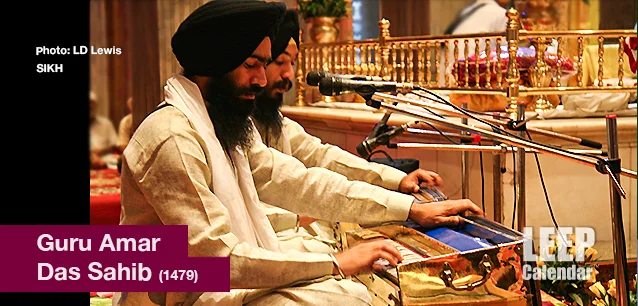 AD
AD
Today is: November 05
Scroll to explore events active on this date.
LEEP INK FEATURES

August? Absolutely!
In August, we live through the Dog Days of Summer. It's hot and often humid, and those who can leave for better climates do. Down south, winter is in full force. August is also known as "the ...

In The Heat of July: July 2025 Events
Is it hot enough (or cold enough if you're below the equator) for you yet? There is actually a day for that! Like every month, I pick a diverse collection of events you may or may not know about. This ...

May Blooms: Events in May 2025
Along with October, May is one of the most densely packed months of the year. It's before the summer humidity and the last whole month of the school year. The weather is warming in t...
About Guru Amar Das Sahib
Religion , Food
Music , Civil Rights
Ends: May 05, 2024
DESCRIPTION:
Guru Amar Das Sahib (May 5, 1479-September 1, 1574), was the third Guru of the Sikhs and an influential spiritual leader in Sikhism. He was born in Basarke, a village near Amritsar in present-day Punjab, India. Guru Amar Das Sahib became the Guru in 1552, succeeding Guru Angad Dev Ji, the second Sikh Guru.
Guru Amar Das Sahib contributed significantly to developing Sikhism and its institutions. Some of his notable achievements include:
Anand Karaj—Guru Amar Das Sahib established the Anand Karaj, the Sikh wedding ceremony, which formalized the institution of marriage within the Sikh faith. This ceremony emphasizes the importance of spiritual and social commitment between the couple and the community.
Langar System—Although the Langar system (community kitchen) began with Guru Nanak Dev Ji, the first Sikh Guru, Guru Amar Das Sahib, expanded and institutionalized it. He made it mandatory for all visitors, regardless of social status, caste, or religion, to partake in the Langar meal before meeting him. This practice promoted social equality, unity, and the spirit of selfless service.
Organization of Sikh Community—Guru Amar Das Sahib organized the Sikh community into 22 dioceses called Manjis, each led by spiritually and socially committed individuals. This system helped in spreading the teachings of Sikhism, managing community affairs, and ensuring the proper functioning of local congregations.
Compositions and Hymns—Guru Amar Das Sahib composed many hymns in the Guru Granth Sahib, the central religious scripture of Sikhism. His compositions emphasized the importance of meditation, devotion to God, and social responsibility.
Elimination of Caste-based Practices—Guru Amar Das Sahib actively discouraged caste-based discrimination and promoted social equality among his followers. He opposed the practice of Sati (a widow immolating herself on her husband's funeral pyre) and encouraged widow remarriage.
Guru Amar Das Sahib's teachings continue to inspire Sikhs worldwide. His focus on social equality, spiritual devotion, and community service are essential to the Sikh faith and values.
VIDEOS
Currently, this event does not have supporting videos.
SUPPORTING DOCUMENTS
Currently, this event does not have supporting documents.
ADDITIONAL IMAGES
Currently, this event does not have supporting images.
Where would you like to go now?
 AD
AD


/footer-logo.svg)
